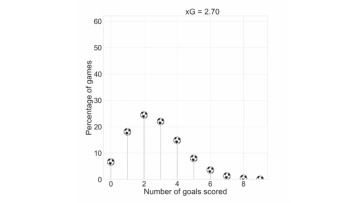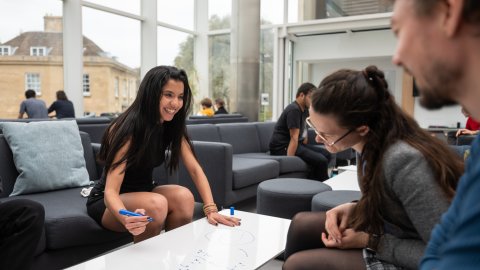In 2010 Paul the Octopus 'correctly' predicted results in the 2010 World Cup. However, these days the experts are the analysts who trawl through the reams of data about players and teams. And where there is data, there is mathematics. And, particularly, mathematical models. Joshua Bull is a mathematical modeller. He was also the winner of the 2020 Fantasy Football competition from over eight million entrants. So when it came to the Oxford Mathematics 2022 World Cup predictor, Josh fitted the bill perfectly.
Strong cosmic censorship versus Λ
Abstract
The strong cosmic censorship conjecture is a fundamental open problem in classical general relativity, first put forth by Roger Penrose in the early 70s. This is essentially the question of whether general relativity is a deterministic theory. Perhaps the most exciting arena where the validity of the conjecture is challenged is the interior of rotating black holes, and there has been a lot of work in the past 50 years in identifying mechanisms ensuring that at least some formulation of the conjecture be true. It turns out that when a nonzero cosmological constant Λ is added to the Einstein equations, these underlying mechanisms change in an unexpected way, and the validity of the conjecture depends on a detailed understanding of subtle aspects of black hole scattering theory, surprisingly involving, in the case of negative Λ, some number theory. Does strong cosmic censorship survive the challenge of non-zero Λ? This talk will try to address this Question!
Deep low-rank transport maps for Bayesian inverse problems
Abstract
Characterising intractable high-dimensional random variables is one of the fundamental challenges in stochastic computation. We develop a deep transport map that is suitable for sampling concentrated distributions defined by an unnormalised density function. We approximate the target distribution as the push-forward of a reference distribution under a composition of order-preserving transformations, in which each transformation is formed by a tensor train decomposition. The use of composition of maps moving along a sequence of bridging densities alleviates the difficulty of directly approximating concentrated density functions. We propose two bridging strategies suitable for wide use: tempering the target density with a sequence of increasing powers, and smoothing of an indicator function with a sequence of sigmoids of increasing scales. The latter strategy opens the door to efficient computation of rare event probabilities in Bayesian inference problems.
Numerical experiments on problems constrained by differential equations show little to no increase in the computational complexity with the event probability going to zero, and allow to compute hitherto unattainable estimates of rare event probabilities for complex, high-dimensional posterior densities.
Random forests and the OSp(1|2) nonlinear sigma model
Abstract
Given a finite graph, the arboreal gas is the measure on forests (subgraphs without cycles) in which each edge is weighted by a parameter β greater than 0. Equivalently this model is bond percolation conditioned to be a forest, the independent sets of the graphic matroid, or the q→0 limit of the random cluster representation of the q-state Potts model. Our results rely on the fact that this model is also the graphical representation of the nonlinear sigma model with target space the fermionic hyperbolic plane H^{0|2}, whose symmetry group is the supergroup OSp(1|2).
The main question we are interested in is whether the arboreal gas percolates, i.e., whether for a given β the forest has a connected component that includes a positive fraction of the total edges of the graph. We show that in two dimensions a Mermin-Wagner theorem associated with the OSp(1|2) symmetry of the nonlinear sigma model implies that the arboreal gas does not percolate for any β greater than 0. On the other hand, in three and higher dimensions, we show that percolation occurs for large β by proving that the OSp(1|2) symmetry of the non-linear sigma model is spontaneously broken. We also show that the broken symmetry is accompanied by massless fluctuations (Goldstone mode). This result is achieved by a renormalisation group analysis combined with Ward identities from the internal symmetry of the sigma model.
A Hele-Shaw Newton's cradle and Reciprocity in Fluids
Abstract
A Hele-Shaw Newton's cradle: Circular bubbles in a Hele-Shaw channel. (Daniel Booth)
We present a model for the motion of approximately circular bubbles in a Hele-Shaw cell. The bubble velocity is determined by a balance between the hydrodynamic pressures from the external flow and the drag due to the thin films above and below the bubble. We find that the qualitative behaviour depends on a dimensionless parameter and is found to agree well with experimental observations. Furthermore, we show how the effects of interaction with cell boundaries and/or other bubbles also depend on the value of this dimensionless parameter For example, in a train of three identical bubbles travelling along the centre line, the middle bubble either catches up with the one in front or is caught by the one behind, forming what we term a Hele-Shaw Newton's cradle.
Reciprocity in Fluids (Matthew Cotton)
Reciprocity is a useful, and often underused, way to calculate integrated quantities when a to solution to a related problem is known. In the remaining time, I will overview these ideas and give some example use cases



